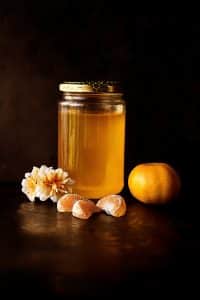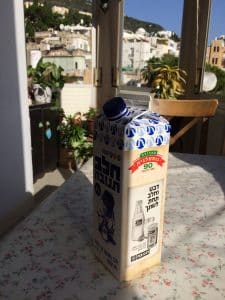“I promise that I will bring you up out of the affliction of Egypt to the land of the Canaanites, the Hittites, the Amorites, the Perizzites, the Hivites, and the Jebusites, a land flowing with milk and honey.” (Exodus 3:17)
God told Moses the plan and the glorious destination – a land flowing with milk and honey. But this plan was not newly-hatched. God had given Abraham the heads up a whole four centuries earlier, telling his friend that he could count on these things all coming to pass:
“Know for certain that your offspring will be sojourners in a land that is not theirs and will be servants there, and they will be afflicted for four hundred years. But I will bring judgment on the nation that they serve, and afterward they shall come out with great possessions. As for you, you shall go to your fathers in peace; you shall be buried in a good old age. And they shall come back here in the fourth generation, for the iniquity of the Amorites is not yet complete.” (Genesis 15:13-16)
God was not in a hurry. He graciously let the Canaanites continue in their sin until it reached its full measure before bringing judgement upon them in the form of the Israelites. God respects our wishes and freedom, including our freedom to sin, but he does have limits. Four hundred years of unbridled sin is a pretty long leash, but finally, in about 1400 BC, enough was enough. The Israelites marched right into Canaan’s land.
God delivers on his promises
Over those four hundred long years, the brothers of Joseph who had come from Israel to Egypt to avoid starving in the famine had become a nation, a couple of million strong.1 And, as it turned out, the journey back to the Promised Land turned out to be pretty long and winding… not to mention full of adventures. But all the while, they had this dream to hold onto—their assured destination—the land of milk, honey, and all good things.
“For the Lord your God is bringing you into a good land—a land with brooks, streams, and deep springs gushing out into the valleys and hills; a land with wheat and barley, vines and fig trees, pomegranates, olive oil and honey.” (Deuteronomy 8:7-8)
 The seven species listed above refer to date honey rather than honey from bees, but we know from other places in the Bible, such as Samson’s lion-and-honeycomb riddle (Judges 14:9) Jonathan breaking his father’s fast when they came across it in the woods (1 Samuel 14:29), as well as John the Baptist’s unusual diet, that honey from the honeycomb was also plentiful in Israel.
The seven species listed above refer to date honey rather than honey from bees, but we know from other places in the Bible, such as Samson’s lion-and-honeycomb riddle (Judges 14:9) Jonathan breaking his father’s fast when they came across it in the woods (1 Samuel 14:29), as well as John the Baptist’s unusual diet, that honey from the honeycomb was also plentiful in Israel.
God gives good gifts to his children. The specific phrase “land of milk and honey” crops up 22 times in the Bible in relation to the Promised Land – it’s a promise that God reiterated over and over. It was a promise they could count on.
Why Milk and Honey?
I heard the explanation, which makes a lot of sense to me, that milk and honey are the ultimate signs of a lush and fertile land. Why? Because livestock can merrily munch grass and vegetation, thus producing milk, while bees can happily visit all kinds of flowers to produce honey. Both indicate, indeed pretty much require, a verdant, pastural landscape.
It is perhaps then no surprise that both milk and honey feature in the Jewish feasts today. They are a byword for decadence, worthy of a feast!
If you ask an Israeli what Shavuot (the Feast of Weeks) is all about, their answer will likely include the giving of the Torah at Sinai and dairy products. The main connotations in Israel are staying up all night to study the Torah, and cheesecake, to be specific! The word of God is often likened to honey in the Bible 2, and milk represents the bounty of the land, which is pretty much what Shavuot is all about.
 “Shavuot? It’s some kind of cheese festival”, explained a Russian new immigrant on the phone to a relative back in the motherland. It’s true that the Biblical meaning of the feasts often get lost in modern traditions, much as celebrations of the incarnation gets swamped with Christmas trees, and the cross with Easter eggs. But the Shavuot enthusiasm with dairy is not entirely random. Some believe it was connected to the verse within a passage about the Feasts, about not boiling a kid in its mother’s milk, which kicked off all the kosher laws (Exodus 23:19). Others see milk as referring to the Torah itself—our nourishment and sustenance. Equally, honey is a key ingredient on the Jewish festal table in the fall, along with all things sweet.
“Shavuot? It’s some kind of cheese festival”, explained a Russian new immigrant on the phone to a relative back in the motherland. It’s true that the Biblical meaning of the feasts often get lost in modern traditions, much as celebrations of the incarnation gets swamped with Christmas trees, and the cross with Easter eggs. But the Shavuot enthusiasm with dairy is not entirely random. Some believe it was connected to the verse within a passage about the Feasts, about not boiling a kid in its mother’s milk, which kicked off all the kosher laws (Exodus 23:19). Others see milk as referring to the Torah itself—our nourishment and sustenance. Equally, honey is a key ingredient on the Jewish festal table in the fall, along with all things sweet.
Judaism, more than others it seems, has a hearty appreciation and celebration of the physical joys of life. God considers the earth he has made, and declares that it is GOOD! Good food, laughter, relationships, running around in fields, milking cows and making bread – it’s all part of God’s wonderful design, created to bring pleasure. Milk and honey are sort of emblematic of the fact that God really does bless us with good things right here on earth, in the physical. It’s not a Platonic either/or, but a both/and situation: we can enjoy the good things God created for us right here on earth, as well as having every spiritual blessing in Messiah.
Milk and honey: the richness of relationship with God
David declared, “How sweet are your words to my taste, sweeter than honey to my mouth!” (Psalm 119:103)

This analogy crops up several times in the Scriptures. God’s word is like honey, but it is also likened to milk later in the New Testament—essential nourishment to our souls, as babies require milk. Similarly, the phrase appears in chapter 4 of Song of Songs:
“Sweetness drops from your lips, O bride; Honey and milk are under your tongue.” (Song of Songs 4:11)
And this Bible verse from Song of Songs has been printed onto milk cartons here in Israel! Rabbinic tradition considers the milk and honey here in this verse to refer to the Torah, since Song of Songs is seen as an analogy of the love relationship between God and his people. Certainly, God’s word is both sweet and sustaining to all who know him and love him.
Have you ever had the experience of receiving a pertinent Bible verse that really hit the nail on the head in your current circumstance? It’s wonderful, isn’t it? A timely word from God can give us such encouragement and strength to keep going. “See how my eyes brightened when I tasted a little of this honey,” said Jonathan to his friends. (1 Sam 14:29). God’s word can energize us when we’re flagging, just like honey rejuvenated that hungry man.
Often in the Bible there’s a physical manifestation which prefigures the greater, spiritual reality to come. The Promised Land really and truly was a land of milk and honey in Biblical times—and has become so once again in our times! But it also points to the greater reality of the richness and sweetness of a life in relationship to God, which can be enjoyed by people from all nations, from anywhere in the world. Yet even more than that awaits us in the ultimate Promised Land—we will have complete union with God in the new heavens and new earth, in the World to Come. What awaits us there? A feast, of course! We are promised a banquet to end all banquets! Who’s guessing there might be milk and honey on that table?
- It is written in the Torah, “The Children of Israel journeyed… 600,000 adult males on foot, besides the children.” (Exodus 12:37) Since the verse only includes the number of men who were 20 years of age and over, we can extrapolate the total population by including the women and children as well. According to Rabbi Yonasan ben Uziel (circa 1st century CE, author of an Aramaic translation of the Five Books of Moses), there were 3 million Jews in total who witnessed the giving of the Torah at Mount Sinai. (see Targum Yonasan – Exodus 12:37) It is probable that a comparable number of Jews left Egypt. (Aish.com)
- Psalm 19:10, Proverbs 24:14, Ezekiel 3:3, Revelation 10:9
Photo by Maddi Bazzocco on Unsplash
















